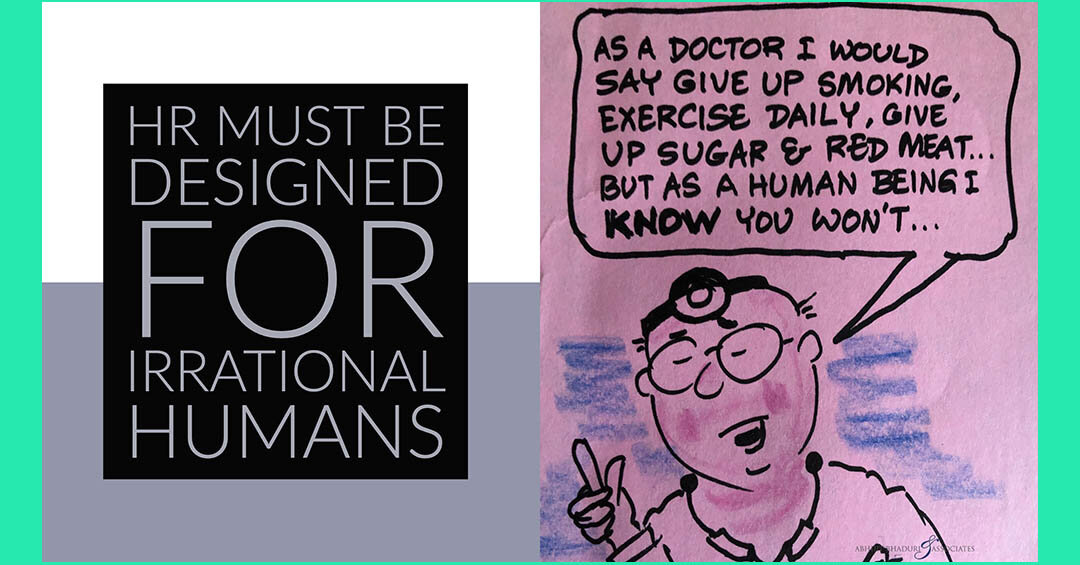Why, what and how questions
I have been in several HR conferences where people have asked some questions repeatedly. One of them is, “Why does HR not get a seat at the table?” Another variant of the question is, “What can HR do to be a business partner?” Since I have been in Learning and Development, I have to routinely answer the question, “How do we calculate the return on investment of the learning & development function?” Those are the most common Why, what and how questions that every HR person will have to answer multiple times over their career. I believe, HR has a problem that Economics has had and solved. Human Resources has been designed for an employee who is logical and rational.
HR was inspired by Homo Economicus
For many years Economists were building their prediction models for a human being who is rational. Such a consumer is consistent and decides on the basis of sound logic. He or she makes choices to further his own self-interest. Economics was all about explaining choices that were rational. Most of us like to believe that we are rational people.
Yet, Economics failed to explain several everyday behaviors.Why do you wear a watch? You have several devices around you that could tell you the time. From the gadgets at home, the vehicle, the mobile … can tell us the time. So there is no rational reason to buy a wristwatch, leave alone an expensive one. When you are sipping a wine and are appreciating it, it may be the price tag and not the grapes or tannin or even the barrel that determines how much you like it. In short, the more expensive wine “tastes” better. The rational human being seems to exist only in Economics theories and books.
Behavioral Economics is already a thing
Richard Thaler’s book Misbehaving speaks of a time when the average grade in a class was 73 marks out of 100 . The students were unhappy with the grading. In the next test, the marks were given out of 130. The average was 94 out of 130. The average grade was still 73% but 94 out of 130 made the students feel better.Maybe that is the problem with Human Resources. It is designed to be used by rational human beings – which is the wrong assumption.
If employees were really rational, there would be no need to get them motivated to do the work that they have signed up and are paid to do. The employee engagement industry is proof that most employees are not motivated. They believe they are in the wrong job. Half the employees worldwide don’t even like their jobs. Most employees want HR to represent them to the decision makers. Yet HR is busy trying to be a “business partner”, a term the employees don’t care about. The mother may buy the toothpaste, but the child may be making the decision about which toothpaste to buy. In being a “business partner”, HR may be chasing the one who is paying for the toothpaste, but the real decision maker is being missed.
HR for the Irrational Human
Dan Ariely has shared research about dating, relationships and marriage. What if the research done on human relationships could be applied to design employee experiences? The video is given at the end of the article
Most hiring decisions are irrational anyway
Organizations really should hire people by tossing a coin if more than half of their new hires do not perform better than the average employee. The new hire is usually brought in at a higher cost than the internal candidate. Companies will repeatedly hire stars who are usually brought in at a salary higher than the existing employees. Even though research conclusively shows that developing internal candidates who are 60-80% ready, is a better strategy.
Don’t Hire the Best was the title of a book I wrote where I have shown that the personality of a leader is far more predictive of his/her success in the new organization than education or experience. Organizations routinely hire leaders based on interviews even though most interviewing panels are very poor at predicting performance of a new hire. We ask people to share their “greatest weakness” even though most people give socially acceptable answers. Employers too share a rosy picture of the role and the organization, thus paving the way for disengagement and disappointment.
What is the ROI of learning?
A senior leader had requested if I could design a workshop on “Leadership Lessons from Golf”. He explained to me that if it was called a training program he would get the budget sanctioned, not for golf.When the organisation is not doing well, the first budget to be slashed is the learning and development. Don’t stop swimming lessons when the Titanic is sinking.
>
“Don’t stop swimming lessons when the Titanic is sinking. ”
The CEO will question the HR leader about the ROI of the training program. If people are trained in a process, they become more efficient. Education is what others do to you. Learning is what you do to yourself. The senior leaders rarely sit through internal training programs and therefore where the give speeches about “lifelong learning”, it is irrational to expect employees to follow.Learning teams are at pains to make learning as much fun as possible. Think of all the games that are played at offsites and the paranoia of the trainer to ensure people are entertained. Given a choice between learning and entertainment, most offsites are designed to focus on the latter. A well-structured learning program can be engaging even if it is not “entertaining.”
Research shows that learning is a process that needs repetition, testing and recall. When people work hard for something they value it more. When organizations certify thousands of employees on a methodology, it dilutes how much the employees value the certificate.
Be nice to people when they quit
Dessert is always the last thing that restaurants want you to remember. Behavioral Science tells us that memorable ending to a vacation is the best way to make it special.When a high performer announces his/her plan to move out, the organization suddenly wakes up to the importance of the employee. When all efforts to retain the employee fail, the relationship must not be allowed to deteriorate. Some organizations allow the employee to return. They are called “boomerang employees”.
If the last day of the employees can be made memorable, the employee is likely to be a brand ambassador. Yet, organizations behave like jilted lovers by taking away access, not calling the employee for meetings (lest he/she steal secrets) and much more.
Design HR for the “Predictably Irrational” employee
Making a job easy by lowering standards will not make employees value it more. HR must make the promotion adequately out of reach. Time-bound promotions kill the motivation to excel. We value the professors who made us work for every mark we got. Talent is not uniformly distributed.Look around and see how much has changed about work and the worker. It is a clear signal that we need to redesign HR. So drop the assumptions of rational human beings. Maybe we will call it Behavioral HR.
Google already has taken a lead in this space by starting a lab called Irrational Lab. Maybe it is time for all organizations to start one too where HR will remove outdated policies and replace them with ones that assume people do not make rational choices (mostly).
A version of this appeared in Business Line on 3rd January 2019



Leave a Reply to Mamta Wasan Cancel reply